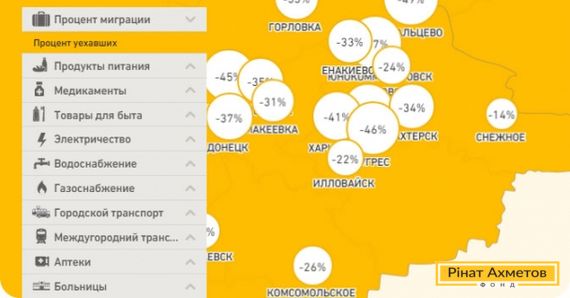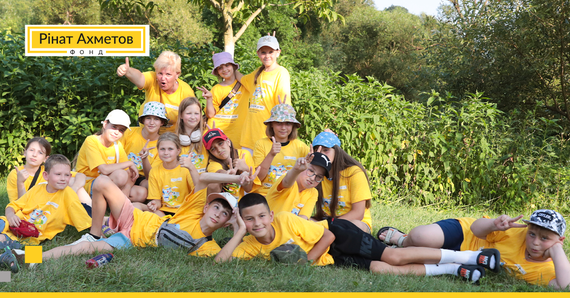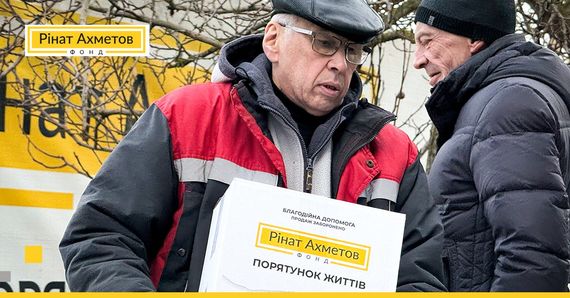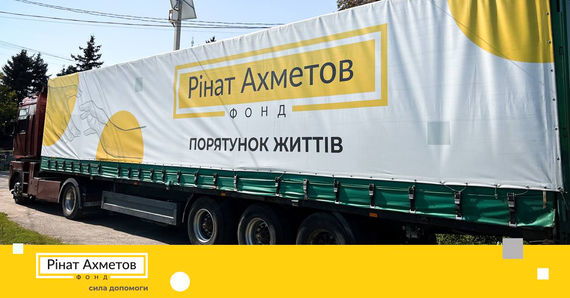HUMANITARIAN MAP OF DONBAS: charity as the way to survive

In late March Rinat Akhmetov Humanitarian Center and Dopomozhemo TV presented an updated Humanitarian Map of Donbas, which shows the needs of ATO area residents and IDPs. It is based on research of Kyiv International Institute of Sociology (KIIS) made in March by order of Rinat Akhmetov Humanitarian Center and Dopomozhemo TV.
"Unfortunately, informational and economic blockade, which residents of Donetsk and Luhansk regions were exposed to, is crowned with sad success", - stated Rimma Fil, Coordinator of Rinat Akhmetov Humanitarian Center, who opened a roundtable discussion, dedicated to the presentation of the updated Humanitarian Map of Donbas. If last year we talked about termination of social benefits for the population of occupied territories, now they state about impossibility to leave ATO area and growing deficit of food and medications.
"Many people asked us: "What will you do when spring comes and everything gets better?" Unfortunately, spring is here, but it is not better at all. Everything got more complicated. And in this situation Rinat Akhmetov Humanitarian Center increases the intensity of its activity, helping our countrymen to survive", - Rimma Fil said. According to her, from August 2014, since the beginning of Humanitarian Center's operation, 2,400,000 survival kits were issued to peaceful residents in Donetsk and Luhansk regions. Over 1 million kits were issued since the start of 2015, which makes more than 13 ths. tons of products. The number of people receiving humanitarian aid from the Center every month exceeds 400,000 people per month. In total the aid was provided to 855,000 people. The Center continues implementing its program for children, helping infants from 0 to 2 years old. Baby formula, porridge and purée were issued for more than 80,000 children during 3 months of 2015. In total the Humanitarian Center issued 156,000 children packages since the beginning of its operation. A new direction of Humanitarian Center’s activity during these three months is the towns on contact and firing line towns. Over this period we provided the residents of 45 such settlements with 125,000 food packages.
"Now our activity has become more difficult. New obstacles from the government are one of the factors that disturb our work, specifically, the complication of permit system to ATO area. If in the beginning of our operation we needed only three documents to deliver humanitarian aid to peaceful residents in need, now the number of required documents and permits increased by five times", - Rimma Fil says. She hopes that Ukrainian authorities will remember that those civilians, who stayed on non-government controlled areas, have Ukrainian passports and they are Ukrainian citizens. "The goal of the state is to do all possible to help its citizens, who appeared in extremely difficult life circumstances", - Rimma Fil, Coordinator of Rinat Akhmetov Humanitarian Center, emphasized.
Life in "reservation area"
Ceasefire agreement and suspension of active military actions have revitalized Donbas. People start to come out, trying to get their lives on the right track. This is proved by KIIS research. According to it, the number of people, who think that life is difficult here, but liveable, increased by 15% in March vs December, which means that there is a certain stabilization and improvement in perception of the situation by residents of the region. Nevertheless, there are 30% of people, who think that it is "impossible to handle this distress anymore". "If compare to November-December, 2014 the assessment of life situation in Donbas is significantly improving. Now 38% of respondents think that situation has improved over these months, and only 17% consider that is has become worse. So we see an obvious progress. This is mainly due to Minsk agreements and ceasefire", - states Natalya Kharchenko, Executive Director at KIIS.
According to sociologists, the most difficult humanitarian situation is observed in Debaltseve, Yunokomunarivsk and Ilovaysk. But global improvement of economic or humanitarian situation is out of question. While it is recorded that the shortage of medications and household goods is decreasing, the lack of food remains at the high level: 45% of respondents state that there is shortage of the most essential food in towns. And they are not talking about caviar or some overseas delicacies, they mean cereals, oil, sugar, fresh meat, tinned fish and fresh dairy products.
"The qualitative research showed a serious deficit of meat and dairy products in ATO area. In some towns they lack bread, because their local bakery stopped working. The towns that suffered during the military actions the most have a serious shortage of drinking water", - Natalya Kharchenko tells. There is enough undemanded household goods on shelves, demand for them reduced in March. However, it does not apply to detergents, soap, shampoo and toothpaste that are in deficit in the East. After shells stopped exploding, people started active repairs of their housing. That is why demand for construction materials has increased a lot, which was not observed before.
Who can earn money and where
Where do Donetsk and Luhansk residents earn money for living? "Our informants tell us that in March the number of beggars on the streets of occupied towns in Donbas increased by several times. This is a very sad tendency", - Daryna Pyrogova, research scientist at KIIS, states. According to in-depth research of sociologists, only one third of the respondents called their work their main source of income. 19% survive due to their pensions. The rest of respondents depend on financial aid of their relatives, spend their own savings, wait for humanitarian aid, or survive due to part-time jobs. "We found out the details on current workplaces there.
It turns out that the most popular segments are "fast money" sectors: trade, transport and service sectors. Cold cash makes these segments active. At the same time only 35% of working people are involved in industrial production", – Natalya Kharchenko says. But those lucky people, who have a permanent job, are forced to get used to new schedules: a full-time five-day working week is out of question. Most of employers in the occupied towns are ready to pay their employees for two or three working days per week. "Humanitarian food is a great support in this situation. You can't buy much food with small salary. Many people survive owing to this aid", - Daryna Pyrogova says.
The sociologists also found out that sometimes the self-proclaimed republics pay social aid to the residents of occupied towns. However, these payments are so small and irregular that people cannot rely on them as on the main source of income. "In March we also found out an interesting story. Everybody knows that it is difficult to cash social benefits from a bank card on the occupied territory. But now they have practices, when some people are ready to do it with a 5% commission", - Daryna Pyrogova says.
Living at home despite everything
However, the requirement in medications in the occupied territories has reduced. This is mostly due to suspension of regular shelling, which resulted in reduced requirement of the locals in cardiac medications and sedatives. Though, they are still in the top-list of pharmacies' sales items. But there is a shortage of medications for hypertensive patients. However there are no lines in pharmacies. "Despite the fact that pharmacies have a limited range of medications, it is enough for us. The reason is that people do not have money for these medicines", - Daryna Pyrogova explains the causes for paradoxical situation. The main problem is that it is difficult to call an emergency in the region. Sociologists found out that it is due to the lack of petrol to fill doctors’ transport.
At the same time the sociologists are surprised that despite the difficult situation in the occupied territory, most of the people do not want to leave their homes and search for better life conditions. "We thought that in spring there will be a new migration wave from ATO area. But as it turned out, 89% of respondents do not want to go anywhere. Most of the people, who want to stay, are tied to their place of residence", - Kharchenko states. According to her, only 6% of respondents say that they would like to leave, but they cannot do it due to several reasons. And only 1% of respondents, which is one in hundred Donetsk or Luhansk residents, are planning to leave till summer. The main reason is strong regional identity and idea of their home town. This feature is common both for ATO area residents and internally-displaced persons, as most of them are waiting for the moment to come back to their home towns. And it is not the only issue. According to sociologists, many people from Eastern regions are scared, because of negative experience of their friends and acquaintances. "A lot of people have some friends or relatives, who left, and they faced many difficulties in other regions. They do not want to repeat the bad experience", - Pyrogova says.
Everything is even worse
"Prices in occupied territories have significantly increased. Those, who preserve economic activity, and still have permanent job and salary, faced that their possibilities reduced much", Enrique Menendez, volunteer from "Responsible Citizens", states. The resident of Donetsk, who experienced the situation in the occupied city firsthand, notes that a week ago the price for a pack of 10 eggs in Donetsk was UAH 25, while it was available at UAH 12 in Kyiv. A litre of drive petrol is UAH 5 more expensive that on Ukrainian territory, one kilogram of potatoes is UAH 13, while it costs only UAH 5 in Kyiv. The volunteer blames economic blockade of ATO area in this situation, which started in January after the President signed the Limited Entry Order for the residents of occupied towns. And escalation of food prices is not the main trouble. People are dying from the lack of medications that are difficult to supply to the territories of self-proclaimed republics. "Everything that is happening in the region is called an economic blockade. We cannot buy the most essential medications for chronic patients. These are mainly diabetics, asthmatics and hypertensive patients. Recently one of people living with HIV, whom we used to help with medicines, died, because he couldn't get life-saving medications", - Menendez states.
The cooperation between the Responsible Citizens and Rinat Akhmetov Humanitarian Center started last year in August. "The Humanitarian Center was the first partner of Responsible Citizens", - Enrique Menendez comments the situation in the region. - At the moment we know about 8 foundations that gained the right to deliver humanitarian aid for Donbas. But we must admit that the volumes of Rinat Akhmetov humanitarian aid are the largest. This aid is the most noticeable in the region; it is a great happiness for people that Humanitarian Center could deliver aid to temporary occupied territories during all this time.
Another huge problem for Donetsk is the quality of drinking water. The wastewater treatment facilities of the city cannot get the necessary reagents, which is why they are working in the restricted mode. "In Donetsk they are joking that tap water has a different smell in every district, but it mostly smells like swamp", - volunteer shares. According to him, this water is harmful not only for consumption. City officials regularly remind local residents that it is highly undesirable for tap water to get on open wounds. As a result, most part of the city is forced to buy bottled water. However, there is not enough water on supermarket shelves due to limited supplies, as the trucks delivering mineral water are stopped at Ukrainian checkpoints. And the kiosks with pure water have a short sign: No water.
"For the better understanding of what the Ukrainian checkpoints are, I would say that they are not only the basic points for Ukrainian army or volunteer battalions. Now there are border troops, customs service and even fiscal police there", - Menendez tells. He also states that his volunteers already faced the facts of corruption. "We had to pay a bribe to transport our humanitarian aid. This happened two weeks ago, when we were delivering 400 kg of diapers that were sent for us from Danish charity givers. We had to pay UAH 800, a bribe to bring in these goods to Donetsk and distribute them to recipients", - the volunteer shares frankly.
Without knowledge and documents
According to Enrique Menendez, he made a request to the city administration to find out how many children of school age are residing in Donetsk today. "According to their information there are from 100,000 to 120,000 children of school and pre-school age. Some of them go to school, some do not. Parents are afraid to let them go to schools. Some schools are not working at all. As far as I know there are 60-70% of schools that keep on teaching their students, - Menendez shares. However, there is a bigger problem than missed classes. School graduates cannot get their certificates of secondary education and cannot get their passports when they reach 16.
"Actually it is quite difficult to receive documents in ATO area: birth certificate, death certificate, and passport. A lot of people cannot get these documents, because they cannot enter government-controlled territory" - the volunteer says. However, Enrique Menendez hopes that soon these problems will be solved at the state level, because we can get out of this difficult situation only by making steps towards each other.
Source: https://kontrakty.ua/



